Politics
G7 ministers unite on Russia pressure, voice support for Gaza truce plan
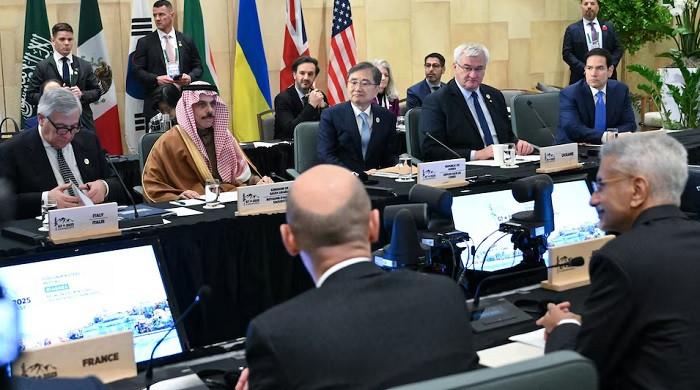
![[4/5] Italys Foreign Minister Antonio Tajani, Saudi Arabias Foreign Minister Faisal bin Farhan, South Koreas Foreign Minister Cho Hyun, Ukraines Foreign Minister Andrii Sybiha, and U.S. Secretary of State Marco Rubio attend a G7+ session on maritime security during the G7 Foreign Ministers Meeting at the White Oaks Resort in Niagara-on-the-Lake, Canada, November 12, 2025.— Reuters](https://www.geo.tv/assets/uploads/updates/2025-11-13/633351_8500200_updates.jpg)
- EU’s Kallas says US concluded Russia not genuine about peace,
- Kyiv renews calls for long-range missiles, energy help.
- US allies call for immediate Russian-Ukraine ceasefire.
The Group of Seven foreign ministers on Wednesday discussed ways to ramp up pressure on Russia over its war in Ukraine, while also voicing strong backing for President Trump’s plan to end the conflict in Gaza and secure the return of Israeli hostages held by Hamas.
The ministers issued a final joint statement in which they expressed strong support for Trump’s plan to end the war in Gaza and for the return of the remaining dead Israeli hostages held by Hamas, while expressing concern about restrictions on the flow of aid to the Palestinian enclave.
A US-brokered ceasefire between Israel and Hamas took effect on October 10, but efforts to advance the second phase of Trump’s plan have faltered.
US Secretary of State Marco Rubio was in Canada’s Niagara region for the meeting, which was also joined by Ukrainian Foreign Minister Andrii Sybiha, who pushed for Kyiv’s allies to strengthen its long-range missile capability and bolster its energy sector as Ukraine enters another winter at war.
Countries attending the gathering of foreign ministers in Canada on Wednesday were also concerned about US military operations in the Caribbean and whether armed strikes on alleged drug-trafficking boats carried out by Washington violate international law.
US President Donald Trump has sought a rapprochement with Moscow and held a summit in Alaska with Putin in August. But he has backed calls for an immediate ceasefire in Ukraine with forces at their present positions, while Moscow has said it wants Kyiv to yield more territory.
The ministers in their joint statement reiterated a call for an immediate ceasefire and said “we are increasing the economic costs to Russia, and exploring measures against countries and entities that are helping finance Russia’s war efforts.”
EU foreign policy chief Kaja Kallas told Reuters on the sidelines of the talks that the discussion on Ukraine revolved around putting more pressure on Russia to seek peace after the US concluded that Moscow was not serious about ending the war.
“In order to make them have peace, we have to put more pressure,” Kallas said. “They (the US) have had engagements (with Russia) and we have all welcomed their engagements so that to really achieve peace. But to be very, very frank… their assessment is that Russia has no way changed its goals so it’s not genuine about the peace talks.”
Efforts to organise a summit between Russian President Vladimir Putin and Trump were put on ice last month, as Moscow’s rejection of an immediate ceasefire in Ukraine cast a cloud over attempts at negotiations.
Ukraine’s Sybiha, after meeting G7 foreign ministers, praised Washington for new energy sanctions imposed on Russian oil companies last month.
“We need to continue to increase the cost of war for Putin and his regime, forcing Russia to end the war,” he wrote on X.
Canadian Foreign Minister Anita Anand earlier announced additional sanctions against Moscow, targeting Russia’s drone program, liquefied natural gas entities and vessels from Russia’s shadow fleet, among others, according to a statement.
Boat strikes
The ministers, in their statement, said they reaffirmed a shared commitment “to strengthening partnership in securing maritime ports and routes against the trafficking of illegal drugs” but made no specific mention of the intensified US military campaign in waters off Latin America.
The US military has carried out at least 19 strikes so far against suspected drug vessels in the Caribbean and off the Pacific coasts of Latin America, killing at least 76 people.
The French foreign minister on Tuesday openly criticised US strikes, while a senior European official on Wednesday said that the G7 meeting would be “the ideal place” for the US military actions to be discussed, though it was not officially on the agenda.
“This is where we are supposed to exchange views on controversial issues – and what the US is doing in the Caribbean is concerning for everyone,” the European official said.
“We have observed with concern the military operations in the Caribbean region, because they violate international law and because France has a presence in this region through its overseas territories, where more than a million of our compatriots reside,” French Foreign Minister Jean-Noel Barrot said on the sidelines of the G7.
The foreign ministers from the G7 wealthy nations held a meeting on maritime security on Wednesday morning, but it was unclear if the boat strikes were directly addressed.
The Trump administration insists those targeted were transporting drugs, without providing evidence or publicly explaining the legal justification for the decision to attack the boats rather than stop them and arrest those on board.
The United States has publicly justified its actions as consistent with Article 51 of the founding UN Charter, which requires the U.N. Security Council to be immediately informed of any action states take in self-defence against armed attack.
While acknowledging the US justification for the strikes, a group of independent UN experts said last month: “Even if such allegations were substantiated, the use of lethal force in international waters without a proper legal basis violates the international law of the sea and amounts to extrajudicial executions.”
On Tuesday, CNN reported that the United Kingdom was no longer sharing intelligence with Washington about suspected drug trafficking vessels in the Caribbean because it believes the attacks are illegal.
A State Department official said Rubio held a brief meeting with UK Foreign Secretary Yvette Cooper on the margins of the G7 meeting.
Colombian President Gustavo Petro ordered Colombian public security forces to suspend intelligence sharing with US intelligence agencies until Washington stops attacking boats in the Caribbean.
Politics
Deal to end longest US govt shutdown in history clears Congress
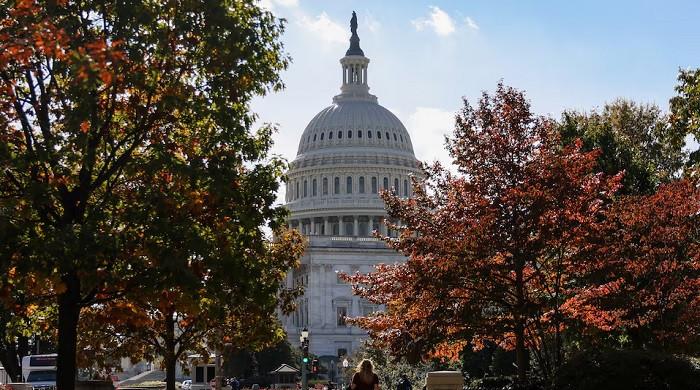
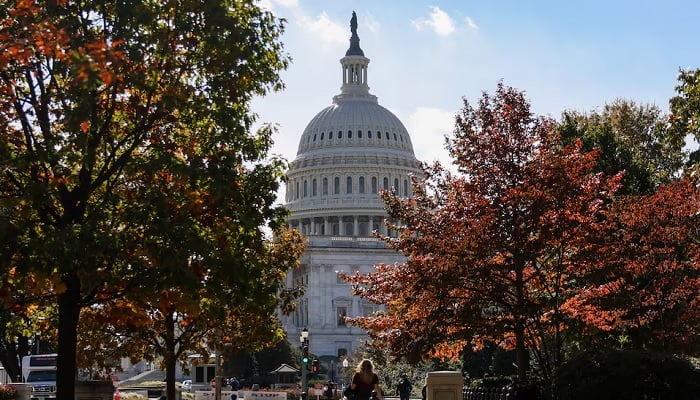
- House votes to advance funding package to end 43-day shutdown.
- Democrats oppose package due to lack of healthcare subsidies.
- Trump supports package, likely to pass with conservative backing.
A deal to end the longest government shutdown in US history cleared Congress on Wednesday, after the House of Representatives voted to restart disrupted food assistance, pay hundreds of thousands of federal workers and revive a hobbled air-traffic control system.
The Republican-controlled chamber passed the package by a vote of 222-209, with President Donald Trump’s support largely keeping his party together in the face of vehement opposition from House Democrats, who are angry that a long standoff launched by their Senate colleagues failed to secure a deal to extend federal health insurance subsidies.
The bill has already passed the Senate, and the White House said Trump will sign it into law later on Wednesday, ending the shutdown.
It would extend funding through January 30, leaving the federal government on a path to keep adding about $1.8 trillion a year to its $38 trillion in debt.
“I feel like I just lived a Seinfeld episode. We just spent 40 days and I still don’t know what the plotline was,” said Republican Representative David Schweikert of Arizona, likening Congress’s handling of the shutdown to the misadventures in a popular 1990s US sitcom.
“I really thought this would be like 48 hours: people will have their piece, they’ll get a moment to have a temper tantrum, and we’ll get back to work.”
He added: “What’s happened now when rage is policy?”
No promises on healthcare
The vote came eight days after Democrats won several high-profile elections that many in the party thought strengthened their odds of winning an extension of health insurance subsidies, which are due to expire at the end of the year. While the deal sets up a December vote on those subsidies in the Senate, Speaker Mike Johnson has made no such promise in the House.
Democratic Representative Mikie Sherrill, who last week was elected as New Jersey’s next governor, spoke against the funding bill in her last speech on the US House floor before she resigns from Congress next week, encouraging her colleagues to stand up to Trump’s administration.
“To my colleagues: Do not let this body become a ceremonial red stamp from an administration that takes food away from children and rips away healthcare,” Sherrill said.
“To the country: Stand strong. As we say in the Navy, don’t give up the ship.”
No clear winner from shutdown
Despite the recriminations, neither party appears to have won a clear victory. A Reuters/Ipsos poll released on Wednesday found that 50% of Americans blamed Republicans for the shutdown, while 47% blamed Democrats.
The vote came on the Republican-controlled House’s first day in session since mid-September, a long recess intended to put pressure on Democrats. The chamber’s return also set the clock ticking on a vote to release all unclassified records related to the late convicted sex offender Jeffrey Epstein, something Johnson and Trump have resisted up to now.
Johnson on Wednesday swore in Democrat Adelita Grijalva, who won a September special election to fill the Arizona seat of her late father, Raul Grijalva. She provided the final signature needed for a petition to force a House vote on the issue, hours after House Democrats released a new batch of Epstein documents.
That means that, after performing its constitutionally mandated duty of keeping the government funded, the House could once again be consumed by a probe into Trump’s former friend, whose life and 2019 death in prison have spawned countless conspiracy theories.
The funding package would allow eight Republican senators to seek hundreds of thousands of dollars in damages for alleged privacy violations stemming from the federal investigation of the January 6, 2021, attack on the US Capitol by Trump’s supporters.
It retroactively makes it illegal in most cases to obtain a senator’s phone data without disclosure and allows those whose records were obtained to sue the Justice Department for $500,000 in damages, along with attorneys’ fees and other costs.
Politics
US imposes missile, drone sanctions in latest bid to pressure Iran
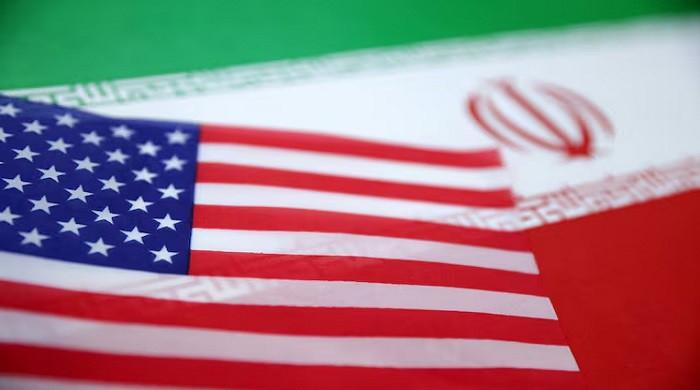

- Targets span Iran, UAE, Turkey, China, HK, India, Germany, Ukraine.
- Treasury says entities operate multiple procurement networks.
- US, Europe, Israel accuse Iran of building nuclear weapons.
The US on Wednesday sanctioned individuals and entities in several countries related to their support of Iran’s ballistic missile and drone production, in the latest attempt to pressure Tehran.
A total of 32 individuals and entities based in Iran, the United Arab Emirates, Turkey, China, Hong Kong, India, Germany and Ukraine that operate multiple procurement networks are being targeted in Wednesday’s designations, the Treasury Department said in a statement.
“These networks pose a threat to US and allied personnel in the Middle East and to commercial shipping in the Red Sea,” the department said in a statement.
The US, its European allies, and Israel accuse Tehran of using its nuclear programme as a veil for efforts to try to develop the capability to produce weapons. Iran says its nuclear programme is for peaceful purposes only.
On Sunday, a top Treasury Department official said that the US wanted to take advantage of a “moment” in Lebanon in which it could cut Iranian funding to Hezbollah and press the group to disarm.
In an interview, John Hurley, the undersecretary for terrorism and financial intelligence, alleged Iran has managed to funnel about $1 billion to Hezbollah this year despite a raft of Western sanctions that have battered its economy.
The US has adopted a “maximum pressure” campaign on Tehran meant to curb its uranium enrichment and regional influence, including in Lebanon, where Iran-backed Hezbollah is also weakened after Israel shattered its military power in a 2023-24 war.
Earlier this month, Washington sanctioned two individuals accused of using money exchanges to help fund Hezbollah, which is deemed a terrorist group by several Western governments and Gulf states.
Tehran has leaned on closer ties with China, Russia and regional states, including the UAE, since September, when talks to curb its disputed nuclear activity and missile programme broke down, prompting the reinstatement of United Nations sanctions.
Western powers accuse Iran of secretly developing nuclear weapons capability. Tehran, whose economy now risks hyperinflation and a severe recession, says its nuclear programme is wholly for civilian power purposes.
Politics
Afghanistan economic recovery buckles as nine in 10 families go hungry or into debt: UNDP
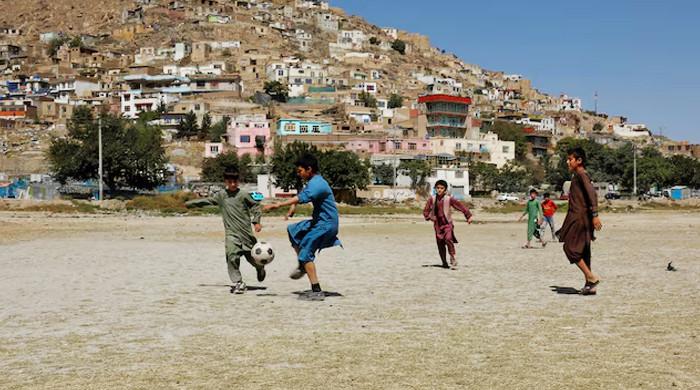
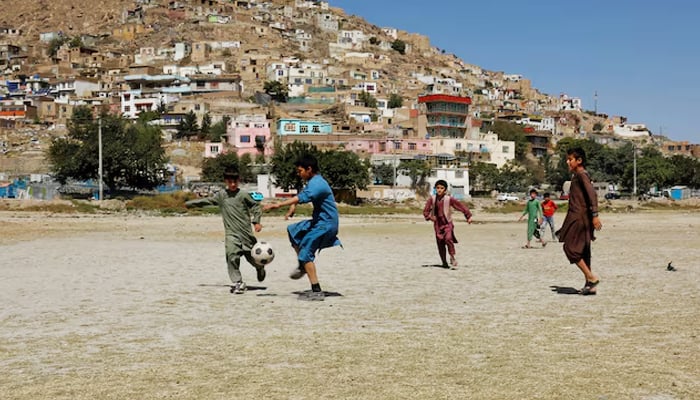
- Nine in 10 Afghan families skip meals, take on debt: UNDP.
- 4.5 million returnees since 2023 strain collapsing economy.
- Women’s workforce share falls to 6%.
Afghanistan’s economic recovery is buckling as nine in 10 households are forced to skip meals, sell belongings or take on debt to survive, the United Nations said on Wednesday, warning that mass returns are exacerbating the country’s worst crisis since the Taliban returned to power.
A United Nations Development Programme (UNDP) report said nearly one in 10 overseas Afghans has been forced back home, with more than 4.5 million returnees since 2023, mainly from Iran and Pakistan, swelling the population by 10%.
On top of that, earthquakes, floods and drought have destroyed 8,000 homes and strained public services “beyond their limits.”
Quakes, floods, and hunger
A survey of more than 48,000 households found that more than half of Afghanistan’s returnees have skipped medical care to buy food, and 45% rely on open springs or unprotected wells for water.
Nearly 90% of returning Afghan families are in debt, owing $373 to $900, up to five times the average monthly income of $100 and nearly half of the annual per-capita gross domestic product, the UNDP said.
In areas with high numbers of returnees, one teacher serves 70 to 100 students, 30% of children work, and joblessness among returnees reaches 95%. The average monthly income is 6,623 Afghanis ($99.76), while rents have tripled.
The UNDP warned that without urgent support to strengthen livelihoods and services in high-return areas, overlapping crises of poverty, exclusion, and migration will deepen.
It said sustaining aid is critical as donor pledges have plunged since 2021, covering only a fraction of the $3.1 billion that the UN sought for Afghanistan this year.
The Taliban government appealed for international humanitarian assistance after a deadly quake struck eastern Afghanistan in September, and it has formally protested mass expulsion of Afghan nationals from a neighbouring nation, saying it is “deeply concerned” about their treatment.
The Ministry of Refugees and Repatriation, the Ministry of Labour and Social Affairs and a government spokesperson did not immediately respond to requests for comment.
Women bear the brunt
Participation by women in Afghanistan’s labour force has fallen to 6%, one of the lowest globally, and restrictions on movement have made it nearly impossible for women who head households to access jobs, education or healthcare.
Kanni Wignaraja, UN assistant secretary-general and UNDP regional director for Asia and the Pacific, said: “In some provinces one in four households depend on women as the main breadwinner, so when women are prevented from working, families, communities, the country loses out.”
Households headed by women, accounting for as many as 26% of returnee families in some districts, face the highest risk of food insecurity and secondary displacement.
The UNDP urged Taliban authorities to allocate more resources and called on donors to lift restrictions on female aid staff.
“Cutting women out of frontline aid work means cutting off vital services for those who need them most,” Wignaraja said.
-

 Sports1 week ago
Sports1 week agoShaheen Afridi Eyes First ODI Series Win as Pakistan Captain – SUCH TV
-

 Business1 week ago
Business1 week agoSetback for expatriates? Delhi HC upholds mandatory EPFO membership; what this means for foreign staff – The Times of India
-

 Fashion1 week ago
Fashion1 week agoGermany’s Adidas achieves highest-ever quarterly sales in Q3 2025
-

 Tech1 week ago
Tech1 week agoZohran Mamdani Just Inherited the NYPD Surveillance State
-

 Fashion1 week ago
Fashion1 week agoBangladesh Bank allows foreign currency-taka swap facility for dealers
-

 Tech1 week ago
Tech1 week agoThe Security Interviews: Colin Mahony, CEO, Recorded Future | Computer Weekly
-

 Tech1 week ago
Tech1 week agoBlood Tests for Alzheimer’s Are Here
-

 Tech1 week ago
Tech1 week agoNokia, Rohde & Schwarz collaborate on AI-powered 6G receiver | Computer Weekly






